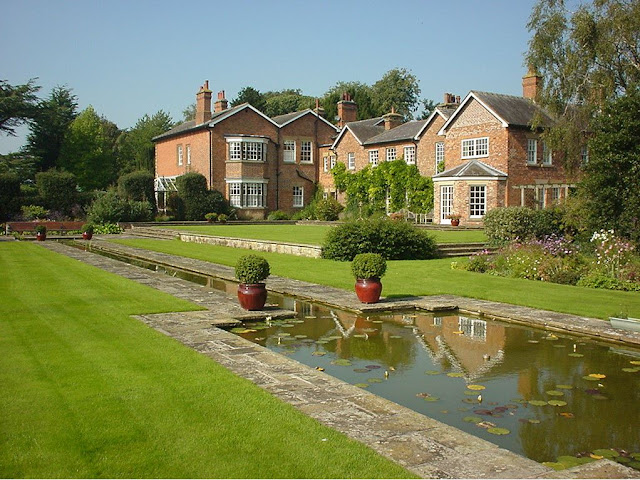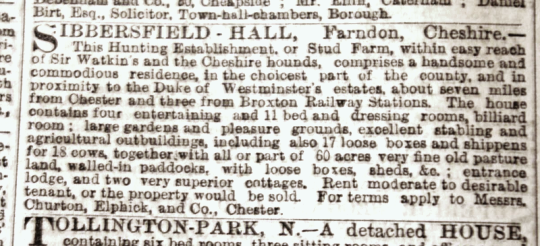The Cheshire Observer, Saturday February 7 1885, page 5
Translated below
Sibbersfield Hall an Incompleted Gift
In the Chancery Division, London, on Tuesday, before Mr Justice Pearson, the case of Hudson v. Creed and others was heard in the form of an originating summons. It was an application by the eldest and only son of the testator, the well-known manufacturer of Hudson’s Extract of soap, asking for a declaration that he was entitled to the Sibbersfield estate, near Farndon, purchased by the testator, the purchase not being competed at the date of death, and that the amount might be ordered to be paid by the executors out of the estate. Mr Cozens Hardy, QC, who supported the summons, said the residuary estate of the testator was given to the children of the testator, and as far as the children were concerned they were most anxious that the plaintiff should have that which, beyond all doubt, the testator wished he should have; but as there were infants here, their consent could not give effect to any arrangement of that kind if the court came to the conclusions that the money should not be paid. The testator entered into a contract for the purchase of the property in July, 1884, and he paid the usual deposit, amounting to £740, and a further sum of £170 for the fixtures, &c. To that extent he submitted it was an actual present gift of the interest the father then had in the estate – Mr Justice Pearson: Do you put in that he declared himself trustee for his son? - Mr Hardy: Yes – Mr Justice Pearson: How can you do that? – Mr Hardy: He said he had given the estate to his son, and he said to the land agent that he wanted to take it over for his son. If the court ruled against him the plaintiff asked for a declaration that he was entitled to the conveyance of the estate on the payment purchase money – Mr Cann and Mr Starling who represented the trustees, did not offer any opposition to what the plaintiff desired if the court saw fit to allow of it – Mr Justice Pearson: I should be very glad to do this if I could. The estate would no doubt have been purchased and paid for had it not been for the uncertainty of human life. The father intended to take steps to complete the purchase, and to hand over the estate to this son had death not prevented him. This case, however, stands in precisely the same category as any other case of an intended gift which has not been completed. I am very sorry, but I cannot make the declaration I am asked to make. The summons must therefore be dismissed. – Mr Hardy: I suppose the costs must come out of the estate? – Mr Justice Pearson: Yes; and I think that is a very proper arrangement – Mr Hardy: I knew that the only opponent I should have would be your lordship. - The Cheshire Observer, 1885
Source: https://www.sibbersfield.com © David Williams



